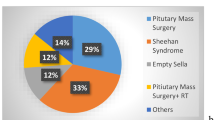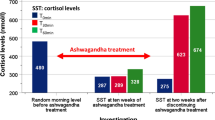Abstract
Objective
To investigate the effect of Chinese herbal medicines for nourishing yin, supplementing qi, and activating blood on the reproductive endocrine-immune network and its mechanisms in patients with primary Sjogren's syndrome (pSS).
Methods
Seventy pSS patients were randomly assigned to two groups using a randomized digital table: the integrative therapy group (36 cases) and the control group (34 cases). Thirty healthy subjects were taken as a normal group. The control group was treated with hydroxychloroquine sulfate tablets alone, and the integrative therapy group was treated by Chinese herbal medicines for nourishing yin, supplementing qi, and activating blood combined with hydroxychloroquine sulfate tablets. The treatment course was 6 months for both groups. Before and after treatment, serum estradiol (E2), testosterone (T), luteinizing hormone (LH), prolactin (PRL) by radioimmunoassay and immunoglobulin (IgG) by immunodiffusion, erythrocyte sedimentation rate (ESR) by Westergren, interferon-γ (IFN-γ) and interleukin-4 (IL-4) by enzyme linked immunosorbent assay were determined.
Results
E2 and T levels in all patients were lower than those of normal subjects before treatment (P<0.05) and were increased significantly after 6-month treatment (P<0.05). ESR, FSH, LH, IgG, IFN - γ, IL - 4 and ratios of E2/T, and IFN -γ/IL in the patients were higher than those of normal subjects before the treatments (P<0.05), and were reduced significantly after the treatments (P<0.05). The T and IFN - γ levels and E2/T ratio in the patients treated with integrative therapy were reduced significantly compared with the control group (P<0.05). However, the PRL levels before and after treatment were not significantly changed in the two groups (P>0.05). The ratios of E2/T and IFN -γ/IL-4, and levels of IgG and ESR were positively correlated before and after treatment (P<0.05).
Conclusions
The ratios of E2/T and IFN -γ/IL-4 might be used as indicators of pSS activity. Chinese herbal medicines for nourishing yin, supplementing qi, and activating blood combined with Western medicine could improve the therapeutic effect by regulating the reproductive endocrine-immune network in pSS patients.
Similar content being viewed by others
References
Zhao Y, Dong Y. The clinical picture of primary Sjogren’s syndrome. Beijing Med (Chin) 1997;9:100–104.
Bowman SJ, Ihrahim GH, Holmes G, Hamburger J, Ainsworth JR. Estimating the prevalence among Caucasian women of primary Sjogren’s syndrome in two general practices in Birmingham UK. Scand J Rheumatol 2004;33:39–43.
Zhou Q, Bai T, Wu HY. Expression of Thl/Th2 and Fas/FasL in the labial salivary gland of patients with Sjogren’s syndrome and its significance. Acta Acad Med Xuzhou (Chin) 2008;28:28–30.
Wu GL, Li TY, Fan YS, Yu GY. Effect of Chinese herbal medicine for nourishing yin, supplementing qi, and activating blood on the Th1/Th2 immune balance in peripheral blood in patients with primary Sjogren’s syndrome. Chin J Integr Med 2013;19:696–700.
Ku LT, Gercel-Taylor C. Alterations of T cell activation signallingand eytokine production by postmenopausal estrogen levels. Imlriun Age 2009;6:1.
Karpuzoglu E, Phillips RA. IFN-inducing transcription factor, T-bet is upregulated by estrogen in murine splenocytes:role of IL-27 but not IL-12. Mol Immunol 2007;44:1808–1814.
Vitali C, Bombardieri S, Jonsson R, Moutsopoulos HM, Alexander EL, Carsons SE, et al. Classtication criteria for Sjogren’s syndrome:a rerised version of the European criteria proposed by the American-European Consensus Group. Ann Rheum Dis 2002;61:554–558.
Ministry of Health, P. R. C. The research guidelines for new drugs of traditional Chinese medicine. 1995:188.
Ruddy S, Harris ED, Jr. Sledye CB, Kelley’s textbook of rheumatology. Philadelphia: Philadelphia W. B. Saunders Company; 2001:1028.
Mitsias DI, Tzioufas AG, Veiopoulou C, Zintzaras E, Tassios IK, Kogopoulou O, et al. The Th1, Th2 cytokine balance changes with the progress of the immunopathological lesion of Sjogren’s syndrome. Clin Exp Immunol 2002;128:562–568.
Zhuang JH, Lin HP, Xu SM, Li B, Zhang LJ, Li JS, et al. Expression of interferon and interlukin-4 in the labial saliary gland of patients with Sjogren’s syndrome and its relationship with infiltration of lymphocytes. J Gannan Med Coll (Chin) 2007;27:165–167.
Li X, Qiu YJ, Han JP. Study on the change of T cell subsets in patientswith primary Sjogren’s syndrome. J Tianjin Med Univ (Chin) 2008;14:51–54.
Zhao Y, Fei YY, Deng XX, Zhang PL, Gan XD, Shi YP, et al. Significance of anti-a-fodrin antibody in the diagnosis of Sjoegren’s syndrome and its correlation with clinical manifestations. Chin J Rheumatol (Chin) 2005;9:261–264.
Porola P, Laine M, Virkki L, Poduval P, Konttinen YT. The infl uence of sex steroids on Sjoegren’s syndrome. Ann NYAcad Sci 2007;1108:426–432.
Mostafa Sl, Seamon V, Azzarolo AM. Influence of sex hormones and genetic predisposition in Sjögren’s syndrome: a new clue to the immunopathogenesis of dry eye disease. Exp Eye Res 2012;96:88–97.
Arakaki Rl, Ishimaru N, Hayashi Y. Immunotherapeutic targets in estrogen deficiency-dependent Sjögren’s syndrome-related manifestations. Immunotherapy 2010;2:339–346.
Zhou JY, Liu J, Lan Y, Zhou M. The Lever of sexual hormone in female primary Sjögren’s syndrome. J Praet Med Tech 2007;14:3931–3932.
Nikolay P. Nikolov, Gabor G. Pathogenesis of Sjögren’s syndrome. Curr Opin Rheumatol 2009;21:465–470.
Pierdominici M, Maselli A, Colasanti T, Giammarioli AM, Delunardo F, Vacirca D, et al. Estrogen receptor profiles in human peripheral blood lymphocytes. Immunol Lett 2010;132:79–85.
Karpuzoglu E, Phillips RA. IFN inducing transcription factor, T-bet is upregulated by estrogen in murine splenocytes: role of IL-27 but not IL-12. Mol Immunol 2007;44:1808–1814.
Hong MJ, Chen XJ. Chinese medicine treatment of Sjogren’s syndrome. J Liaoning Univ Tradit Chin Med (Chin) 2013;15:216–218.
Wu GL, Li TY, Fan RS, Yu GY. Therapeutic effect of Chinese herbal medicine for strenthening qi, nourishing yin, and remove stasis on the level of osteopontin in peripheral blood and quality of life in patients with primary Sjogren’s syndrome. Chin J Integr Med 2011;17:710–714.
Wu GL, Pu XH, Li TY, Yu GY. Study on intervention of nourishing yin, strengthening qi, and activating blood method on submaxillary glands of NOD mice with Sjögren’s syndrome. Gansu J Tradit Chin Med (Chin) 2012;25:29–34.
Wu GL, Pu XH, Li TY, Yu GY, Lu WW, Fan YS. Effect of Yangyin Yiqi Huoxue Decoction on immune balance of Th1/Th2 in serum and submaxillary glands of NOD mice with Sjogren’s syndrome. Chin J Integr Tradit West Med (Chin) 2013;33:1653–1657.
Author information
Authors and Affiliations
Corresponding author
Additional information
Supported by the National Natural Science Foundation of China (No. 81473604)
Rights and permissions
About this article
Cite this article
Wu, Gl., Wu, Ny., Li, Ty. et al. Effect of Chinese herbal medicines for nourishing yin, supplementing qi, and activating blood on reproductive endocrine activity and immune functions in patients with primary Sjogren’s syndrome. Chin. J. Integr. Med. 21, 778–783 (2015). https://doi.org/10.1007/s11655-015-2323-y
Received:
Published:
Issue Date:
DOI: https://doi.org/10.1007/s11655-015-2323-y




